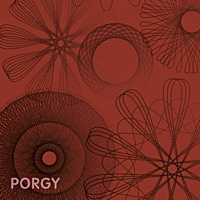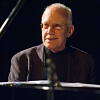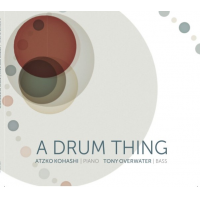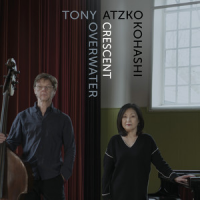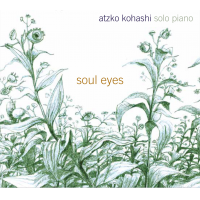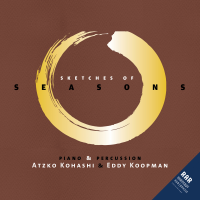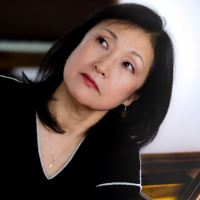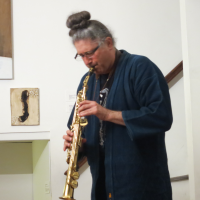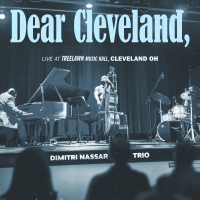After studying classical piano in Japan and a first contact with jazz in the big band of her university, Atzko Kohashi went to New York where she studied with Steve Kuhn, before moving to Amsterdam where she is now part of the Dutch jazz scene. She will play in duo with bassist Frans van der Hoeven before forming a trio with trumpeter Angelo Verploegen and another bassist known in our country for a short collaboration with Nathalie Loriers, but also for his interest in Arab music, Tony Overwater. This trio will release in 2019 the beautiful "Virgo" already on the label Jazz in Motion, a project where the influence of Zen philosophy already illuminates the entire album. With this duet "Crescent", the pianist and the double bassist continue their way in serenity and intimacy. If the album includes four compositions by John Coltrane, three of them come from the album "Crescent", whose interiority was to contrast with the rest of the saxophonist's discography. "Wise One" and "Lonnie's Lament" plunge us into a dark and intimate atmosphere that is prolonged by another Bob Haggart theme, "What's New", which Coltrane also used on the "Ballads" album. Another Coltrane theme, "Mir Syms" is taken up in a more bluesy atmosphere. Three other tracks inspired by Charlie Haden this time continue in this same atmosphere of meditation: "Nightfall" that Haden recorded with pianist John Taylor, "As Long as There is Music" recorded with Hampton Hawes and "Our Spanish Love Song" from "Beyond the Missouri Sky" in duet with Pat Metheny. Here is an album with a marked inspiration where Atzko Kohashi and Tony Overwater show a great sensitivity and a perfect communion of spirit. A beautiful original and central piece in the album is signed by the double bass player, "De Boot", perfect reflection of the general atmosphere of this very beautiful and soothing album. by Jean-Pierre Goffin A JazzMania / Jazz'halo collaboration Japanese aesthetics and jazz, does that go together? Certainly. Listen to how the pieces by Duke Ellingston, Wayne Shorter and Pat Metheny sound on this new CD. Simplicity and purity, as you see it, the Japanese Shodo (calligraphy), Sumi-e (ink drawings), Ikebana (flower arrangements), Sado (the tea ceremony) and the Noh (theater). The Japanese pianist Atzko Kohashi seeks that simplicity and purity in her music by holding on to Shoshin, a concept from Zen Buddhism that means something like "beginner's mind" - an open attitude, curious, unprejudiced. In that atmosphere Atzko made a recording with two Dutch musicians who also know how to play from that simplicity and openness: bass player Tony Overwater and trumpet player Angelo Verploegen (here on the flugelhorn, a kind of trumpet with a veiled sound). Old jazz favorites and a few new songs, played live, all in one go without overdubs or editing - simple, pure and honest. That the recording is also simply analogue on stereo tape is part of that. Music as a calm beating heart. (VPRO NPO3FM, Netherlands) The Japanese pianist Atzko Kohashi seeks that simplicity and purity in her music by holding on to Shoshin, a concept from Zen Buddhism that means something like "beginner's mind" - an open attitude, curious, unprejudiced. In that atmosphere Atzko made a recording with two Dutch musicians who also know how to play from that simplicity and openness: bass player Tony Overwater and trumpet player Angelo Verploegen (here on the flugelhorn, a kind of trumpet with a veiled sound). Old jazz favorites and a few new songs, played live, all in one go without overdubs or editing - simple, pure and honest. That the recording is also simply analogue on stereo tape is part of that. Music as a calm beating heart. Kohashi doesn't remind me of any other pianists I've heard. She brings a meditative quality, a sense deep listening and emotional responsiveness, to the piano itself and to the other musicians in the trio. (By MARK WERLIN December 11, 2018 on All About Jazz) ''Still waters run deep. A saying that certainly applies to pianist Atzko Kohashi which operates from the Netherlands since 2005. With great attention to sound, color and atmosphere models the Japanese ever again beautiful open spaces. Kohashi took 'Lujon' with a trio comprising bassist Frans van der Hoeven and drummer Sebastiaan Kaptein. With that first she is since her arrival in the Netherlands, a duo which they released several albums. Kaptein also with the pianist released a duo album out. Together they form a trio that regularly morning concerts since 2013 in the Beaufort in Austerlitz, resulting in it now appeared 'Lujon. "Lujon" coexists four trio compositions free arrangements of compositions by, among other Miles Davis, Wayne Shorter, George Gershwin, Baden Powel, Charlie Chaplin ("Smile") and Henry Mancini (Lujon). Ranging repertoire that recognize a need to cozy trio pieces in which the musicians on par conduct a constant conversation. That partly improvised conversations have an open and often understated character and provide the group dynamics of a harmonious, almost zen-like atmosphere. 'Lyon' consists of melancholic mysterious and serene trio pieces performed by top musicians whose playing is thoughtful and self-aware. The dialogues between Kohashi, Van der Hoeven and Kaptein have a lasting fascinating content which depth, dynamics and creating room for error. "Lujon 'is thus a long life." (Jazzenzo.nl) “Jazz-pianiste Atzko Kohashi heeft al eerder cd's uitgebracht met duetten met uitmuntende geluidskwaliteit, nu is er Lujon een cd met het klassieke piano trio. De schitterende opnames (One to One FDR mastering) vonden plaats in Hilversum en zijn uitgebracht door een Japanse platenmaatschappij (Cloud). Muzikaal is het een avontuurlijke reis in de jazz traditie met bass, drums en piano waar het oosten en het westen samenkomen. Lujon staat vol met mooie uitvoeringen van standards (o.a. Quiet van Danny Zeitlin, Gentle Piece van Kenny Wheeler) en improvisaties van de drie hoofdrolspelers. Luistertrip!” (Concerto, Amsterdam) "Japanese jazz pianist Atzko Kohashi has been living in Amsterdam since 2005. All these years to her immense satisfaction, as she writes in the liner notes to her latest album. The city inspires her; she has encountered many wonderful people, and she extols the rich jazz history of the Dutch capital, which boasts visits by many of the greatest names from the history of jazz. Clearly the album title 'Amstel Moments' is of great significance to this jazz pianist. With 'Amstel Moments', both Atzko Kohashi and bassist Frans van der Hoeven have recorded the first duo album of their career. And do they get off to a good start! Because the record is a wonderful sampling of their ability, combining abundant craftsmanship with a subtle sensibility for each other's emotions. All twelve tracks develop in a quiet, contemplative tempo. They never adorn their music with unnecessary edges or boastful display of virtuoso technique. Simply because this pianist and bassist don't need it: the way they play music reveals everything, both their personality and their musical ideas. Within the almost serene stillness that they create, they manage to add their own conceptions to the laws of jazz. For example, the tempo of the standard 'Don't Explain' is so slow that you wonder if the bass or the piano might stumble and fall. But far from it: the slowness adds an exciting distinction to the song. It is impressive how these two musicians communicate. Invariably their dialogue is harmonious: neither of them takes the lead, no one breaks out. Theirs is a continuous exchange of giving and accepting, elaborating and adding of own emotions and insights. That makes 'Amstel Moments' an exceptional recording and a delightful addition to the history of jazz city Amsterdam.” (Jazzenzo.nl)) “Japanese jazz pianist Atzko Kohashi, who is self-taught but also took lessons from Steve Kuhn, is in love with Amsterdam. While she was successful in her home country and even spent seven years in the jazz Mecca New York, she waxes lyrical about the musical climate in Amsterdam in her interviews and the liner notes to her latest CD 'Amstel Moments'. Atzko enjoys the freedom and tolerance, the candor and down-to-earth mentality that permeate life in 'Mokum', the Dutch capital. Perhaps that's why she called her debut album 'Amstel Delight'. Yet it is part coincidence that she took root in the fertile Dutch musical soil. She arrived here as an expat together with her husband, who was posted to Amsterdam. So we can only wait and see how much longer we'll be able to enjoy Atzko live at the Bimhuis. That's why it was a good choice that she recorded her music. An even better choice was that she engaged bassist Frans van der Hoeven, who is well known in jazz circles and selected a superb recording studio. The mastering of 'Amstel Moments' is also agreeably warm. This has worked wonders for the meandering, resolute play of Atzko in the style of Keith Jarrett and Bill Evans, and for the rounded out sound of Frans' bass. You won't hear the bustle of the city with Kohashi, as her own compositions and interpretations of less well known American repertoire exude a delightful serenity. Atzko plays with a mellowed maturity and a deep passion for piano jazz, possibly betraying a profound connection to Zen Buddhism. (Jazzflits.nl) Hanging delicately together by a shining silver thread, Aeon Trio’s music ebbs and flows from the speakers like rippling water… Playing with a delicacy and subtlety rare in an age dominated by in your face, rapid fire rap lyrics and heavy metal’s dense riffage, Maya Fridman, Atzko Kohashi and Franz Van Der Hoeven have crafted pieces and reimagined classics for an unspecified Elegy. (by James Fleming) "Natural, Warm, Human; The melody of life abroad from Atzko Kohashi" (The Holland Times) "Atzko Kohashi releases her new CD in a fantastic style we know from Bill Evans and Keith Jarrett. This is a definite 'must hear', an album that will grow on you. A wonderful interplay between the piano, played by Atzko, and the bassist Frans van der Hoeven." (Concerto, Platomania/Amsterdam) "Including their repertoire on the CD “Amstel Moments,” the duo by Atzko Kohashi and Frans van der Hoeven sounds open-minded and heart-to-heart, being neither stylish nor superficial. It's pleasant but still very thoughtful. “ (Music Magazine/Japan) "Amazing interpretation on "Don't Explain" within just 4 minute 23 second!! It's very thoughtful and artistic, giving us a feeling of dialogue beneath it." (M.Goto/ Jazz critic) Deep emotions are the duo recordings of singer Denise Jannah with the pianist from Japan Atzko Kohashi. Jannah is a singer who knows how to hit the listener right in the heart in the starting song 'A Time For Love'. Gomes has a slightly hypothermic character in her talk, Jannah dives deep into the text and melody with refined bows of her voice. Carefully she kneads the words and models them with her artistic message. A recording that leaves the listener speechless in his chair. The sing-along 'Black Coffee' is considerably lighter in touch. Full of melancholy is the performance of 'Answer Me My Love', with that typical light vibrato to which Jannah has a patent. Wonderful is the piano intro of Atzko Kohashi on Sammy Fain's 'Alice In Wonderland'. Her collaboration with the singer is exemplary: she really brings the songs to life and seamlessly supports the singer with small and subtle accents. How Kahashi then gives a new impulse to the relaxed 'Lazy Afternoon' is simply impressive. The energetic counter-melody that she develops shows great musicality. The Surinamese 'Wan Nyun Dei' closes the record. (Jazzenzo)
Show less

